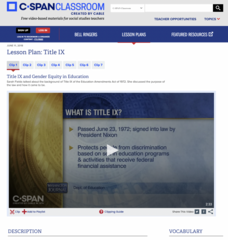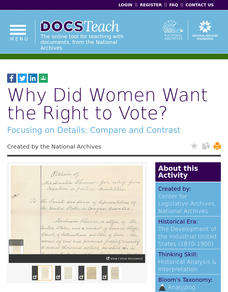C-SPAN
The Equal Rights Amendment (ERA)
The United States is built on the presumption of equality—yet we have not passed the Equal Rights Amendment to the Constitution. Using video clips featuring historians, a museum tour, and an interview with Ruth Bader Ginsberg, learners...
C-SPAN
Landmark Supreme Court Case: Roe v Wade
Perhaps no issue is as controversial than abortion in the American landscape. Go beyond the rhetoric by examining the Supreme Court case that legalized abortion in the United States. A guided note-taking activity unpacks the arguments...
C-SPAN
Jane Addams and John Dewey
Imagine living where there was eight inches of garbage on the street! These were the situations the Progressive movement sought to reform. Using video clips about John Dewey and Jane Addams, learners consider the philosophies and impact...
National Woman's History Museum
Breaking Barriers: Women’s Basketball Documents
Is basketball ladylike? A pressing debate in the nineteenth century explored the issue in the sports world. Using images, news reports, and the rules of the game, young scholars decide whether the sport helped advance the cause of women...
National Woman's History Museum
The Supreme Court and the Lives of American Women 1908-2005
While Roe v. Wade and the passage of the Nineteenth Amendment often get top billing in women's history, other lesser-known laws impact their daily lives. Pupils research cases such as Planned Parenthood v. Casey and use a jigsaw model to...
National Woman's History Museum
Feminist Philosophers of the 20th Century
Reclaim forgotten philosophers of the twentieth century. Feminist philosophers have shaped our current concepts of politics and gender, but they are seldom mentioned in the classroom. Change that omission with a lesson plan that includes...
C-SPAN
Women's Suffrage and the 19th Amendment
The right to vote was hard-won after decades of organizing by women and their allies. Using a series of video clips featuring women's historians, class members consider the efforts behind the Nineteenth Amendment. Possible extension...
Museum of the American Revolution
Through Their Eyes: Major Causes and Events of the American Revolution
Looking for an efficient way to explore the causes and results of the American Revolution? The American Revolution Museum offers a seven-lesson series to hit the highlights of this turning point, using primary sources and activities such...
C-SPAN
Wonder Girls - Advocating for Global Issues
Move over Wonder Woman ... here come the Wonder Girls! Using video clips of photographer Paola Gianturco talking about her work, pupils consider the life experiences of girls around the world, including places such as Tonga and India....
C-SPAN
Title IX
There's more to Title IX than equality in sports. The federal statute—aimed at preventing gender discrimination—guides how schools handle everything from sports to sexual assault. A series of clips from athletes and schools delves into...
DocsTeach
The Impact of Westward Expansion on Native American Communities
Although Westward Expansion is often romanticized, its impact was devastating on Native American communities. Primary source documents, including pictures of United States troops invading indigenous lands and Native American tribes, tell...
DocsTeach
The Civil War: Celebrate or Commemorate? Debate Definitions
Match game for the win! Build learners' historical vocabulary using an interactive matching game. Class members match each term to its definition with a tap. A writing prompt rounds out the lesson, leading to further discussion on how...
National Park Service
Discover the Mary Ann Shadd Cary House
Mary Ann Shadd Cary was an extraordinary woman, no matter the time period. Academics research the life and achievements of Mrs. Cary, who was born a free African American in 1823. The lesson uses primary sources, worksheets, written...
DocsTeach
Why Did Women Want the Right to Vote?
No taxation without representation may have been the battle cry of the American Revolution, but women used the same argument when demanding their right to vote in the late 1800 and early 1900s. Young historians examine petitions from...
DocsTeach
Reasons for Westward Expansion
"Go West, young man!" is a familiar refrain in American history. But why did people leave their homes in the East to travel westward and what impact did that movement have on people already living in the American West? By examining...
DocsTeach
Evaluating Perspectives on Westward Expansion
Although popular culture tells the story of the American West simplistically, its reality is far more complex. Native American tribes—while already on the land—didn't have the same interests, and conflicts between white settlers and...
DocsTeach
To What Extent was Reconstruction a Revolution? (Part 2)
While Reconstruction laid the groundwork, many believe its revolutionary ideals weren't realized until the 1960s Civil Rights Movement. Using the 1965 Voting Rights Act, budding historians consider why it took more than 100 years to...
DocsTeach
To What Extent was Reconstruction a Revolution? (Part 1)
Some scholars consider the Civil War and Reconstruction a second American Revolution. Class members weigh in after examining primary sources, including a Congressional resolution calling for the Fifteenth Amendment and the credentials of...
DocsTeach
The Civil War: Commemorate or Celebrate?
While the Civil War ended over 150 years ago, Americans are still unsure how it should be remembered. Is the tragic conflict to be celebrated for bringing freedom to African Americans or commemorated for its sad place in US history?...
DocsTeach
The Civil War as Photographed by Mathew Brady
While there are no photographs of actual battles during the Civil War, the pictures of Matthew Brady still paint a vivid image of what life was like as a solider. Using a series of photographs, including those of camp life and the...
DocsTeach
Lincoln's Suspension of Habeas Corpus During the Civil War
What is the balance between constitutional rights and security during a war? Young historians debate the question while looking at Lincoln's decision to suspect habeas corpus during the Civil War. After reviewing his order, discussion...
DocsTeach
Oh Freedom! Sought Under the Fugitive Slave Act
Using the harrowing story of the Crafts, a couple enslaved in the South who escaped to freedom, young historians trace the story of the Fugitive Slave Act. After examining documents, including affidavits and arrest warrants for the...
DocsTeach
Juneteenth General Order
While Juneteenth was more than 150 years ago, today Americans debate whether it should be a national holiday. Using a military declaration proclaiming the last of the enslaved people in Texas free, individuals look at the significance of...
DocsTeach
How Effective were the Efforts of the Freedmen’s Bureau?
The legacy of Reconstruction and the Freedman's Bureau is complicated. Using an interactive web resource, learners literally weigh the evidence using an online program in primary sources such as labor contracts and marriage records to...

























